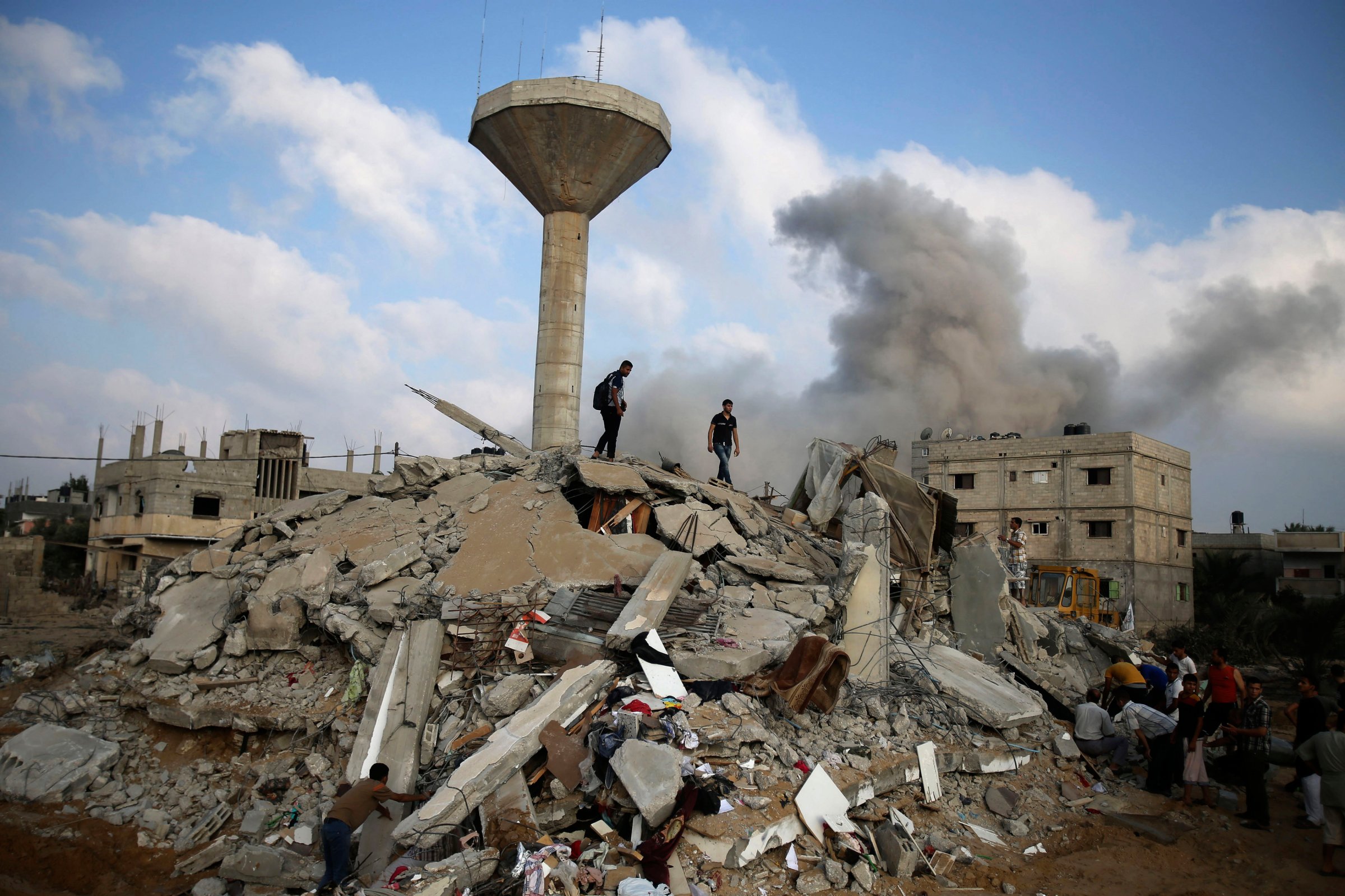
Chances of peace in the Gaza Strip looked very remote Tuesday morning, as Hamas militants penetrated Israel, and Israeli forces ratcheted up their military offensive in the Palestinian coastal territory.
Israeli aircraft, artillery and ground troops continued to pummel the conflict-ridden enclave after a raft of proposed humanitarian truces discussed over the weekend ahead of the Muslim holiday of Eid el-Fitr ultimately failed to take root.
Live feeds broadcasted online throughout Monday night and into the early hours of Tuesday provided outsiders with a glimpse of the grim reality of life inside the besieged territory, as Operation Protective Edge entered its third week. Drones hummed out of sight and illumination flares cast an eerie light over Gaza’s skyline, while explosions rumbled in the darkness.
“[Israel] did a very, intensive bombing campaign last night that most people in Gaza say was the worst night of this conflict so far,” Nathan Thrall, a senior analyst with the International Crisis Group’s Middle East and North Africa Program, tells TIME.
On Tuesday, the Israeli Defense Forces (IDF) targeted the home of senior Hamas figure Ismail Haniyeh with aerial bombardments. The Al Shorouq building in central Gaza City, which is home to a television station affiliated with Hamas, was also hit with airstrikes. Despite the onslaught, the Hamas leadership struck a defiant tone.
“My house is not more valuable than the houses of other people, destroying stones will not break our determination,” said Haniyeh, according to a statement posted by his son on Facebook.
Earlier on Monday, Israeli media reported that Hamas forces succeeded in entering the country by way of an underground tunnel — the sixth such foray since hostilities erupted earlier this month. At least five Israeli soldiers and one militant were killed during the firefight that erupted near the site of the infiltration.
Following the attack, Israeli Prime Minister Benjamin Netanyahu took the airwaves to warn of a prolonged war with Hamas.
“Patience and determination are needed in order to continue the struggle against a murderous terrorist organization that aspires to our destruction,” he said.
“We will not complete the mission, we will not complete the operation, without neutralizing the tunnels, the sole purpose of which is the destruction of our civilians and the killing of our children.”
The Netanyahu Administration has pledged on myriad occasions to continue the ground offensive inside Gaza that began more than a week ago with the goal of dismantling a network of tunnels permeating Israel’s borders.
However, analysts say it’s unlikely the administration has any interest in deploying a full ground incursion in order to re-occupy dense urban areas of the Strip or upping their goals to include disarming Hamas.
“He’s limiting the scope of the operation, setting limited goals that are achievable so that he cannot be as easily accused of failure when it’s all over,” says Thrall.
But as the operation enters its 22nd day, the civilians of Gaza continue to bear the harshest burnt of the Israeli military operation.
The latest audit by the U.N. Office for the Coordination of Humanitarian Affairs put the kill count in Gaza at 1,065, a vast majority of which are believed to be civilians including hundreds of women and children. More than 50 Israeli have also died during the fighting, most of whom are soldiers.
The Israeli Defense Forces (IDF) reportedly began inundating at least three Gaza neighborhoods in the past 24 hours with leaflets warning thousands of residents to evacuate the area ahead of an approaching assault. In response, the U.N. warned Israel against continuing with an intensified push into residential areas.
“This would have a further devastating humanitarian impact on the beleaguered civilians of those areas of the Gaza Strip, who have already undergone immense suffering in recent days,” read a statement released by the spokesperson for U.N. Secretary-General Ban Ki-moon.
“The United Nations agencies present in Gaza do not have the resources on the ground to cope with, or provide assistance to, an enormous extra influx of desperate people.”
The fighting to date has displaced an estimated 215,000 people in Gaza.
More Must-Reads from TIME
- Donald Trump Is TIME's 2024 Person of the Year
- Why We Chose Trump as Person of the Year
- Is Intermittent Fasting Good or Bad for You?
- The 100 Must-Read Books of 2024
- The 20 Best Christmas TV Episodes
- Column: If Optimism Feels Ridiculous Now, Try Hope
- The Future of Climate Action Is Trade Policy
- Merle Bombardieri Is Helping People Make the Baby Decision
Contact us at letters@time.com